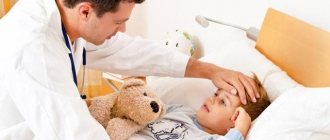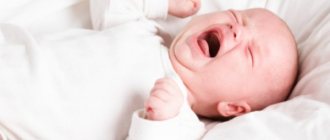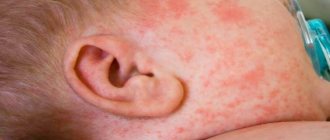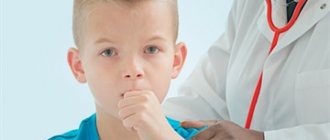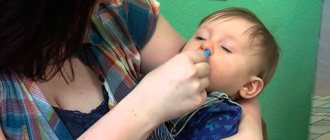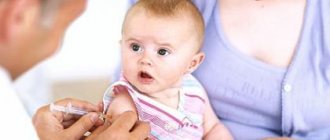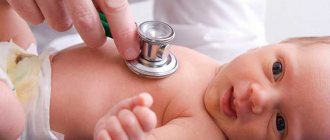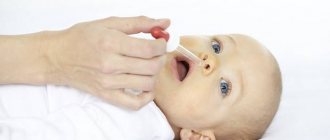Allergic cough is a fairly common phenomenon, often occurring in children who suffer from diathesis in infancy. Such a child may develop a cough even with a small amount of allergen.
Allergic cough - dry, barking. In this case, it is not accompanied by sputum production, as with a cold, for example. Before the attack begins, the child may complain of breathing problems or lack of air. This sign signals the onset of a mild degree of suffocation, which occurs due to swelling of the mucous membrane of the bronchi and larynx. What to do if a child has a similar symptom?
Causes
An allergen can be any substance. Coughing is caused in most cases by substances that may be contained in the inhaled air. They enter the body in various ways. How does an allergic cough occur?
Under normal conditions, the immune system of a healthy person reacts aggressively only to bacteria, microbes and other dangerous microorganisms and substances. But an allergic person’s immunity works differently: it reacts even to harmless external factors, such as:
- Dust;
- Sunlight;
- Animal wool;
- Various smells, especially flowers, perfumes, pollen.
This causes various manifestations, which are commonly called today an allergic reaction of the body.
The main factors that increase the risk of allergies and allergic cough can be identified:
- Hygiene. There is an opinion that with the development of progress, people's passion for cleanliness has increased. We stopped contacting many allergenic factors, as a result, our immune system weakened and began to perceive them as some kind of danger.
- Antibiotics. It is known that the use of antibiotics during pregnancy and in the first year of a child’s life increases the risk of allergies.
- Chemistry. Additives and chemicals are strong allergens. In addition, they disrupt the endocrine system and increase the susceptibility to the development of allergic reactions.
The main allergens that can cause a severe reaction include:
- Some foods, especially nuts, honey, dairy products.
- Dust (book, house dust).
- Pet hair, bird feathers, fluff.
- Mushrooms, fungal spores.
- Medicines (absolutely any medicine can cause an allergic reaction).
- Pollen of any plants: cultivated, weed, medicinal.
- Insect poison (wasps, bees, mosquitoes).
- Chemicals and additives.
Possible diseases
A dry, obsessive allergic cough in a child may be accompanied by respiratory failure. If contact with the allergen continues for a long time, complications are possible in the future, such as:
- Obstructive bronchitis;
- Tracheobronchitis;
- Bronchial asthma;
- Hay fever;
- Allergic bronchitis;
- Allergic tracheitis;
- Allergic rhinitis.
Any child’s complaints about difficulty breathing should alert parents, since in such a case the cough may result in an attack of suffocation. The pediatrician must know about this and prescribe additional examination and consultation with specialists.
Diagnosis and treatment
Diagnosis of allergic rhinitis at home is impossible due to the similarity of symptoms with colds and acute sinusitis. Only an experienced doctor can make the correct diagnosis and prescribe the optimal course of treatment. If necessary, the ENT specialist can refer the patient to an allergist for further examination.
Friends! Timely and correct treatment will ensure you a speedy recovery!
There are the following methods for diagnosing vasomotor rhinitis:
- taking anamnesis;
- rhinoscopy;
- immunosorbent test;
- skin test.
When collecting an anamnesis, the frequency and intensity of symptoms, the average duration and time of onset of attacks, the duration of the course and dosage of previously taken medications, the presence of side effects, symptoms and the degree of their severity are clarified. In most cases, it is possible to make a diagnosis and prescribe a course of therapy at this stage of diagnosis.
Using a rhinoscope, the otorhinolaryngologist conducts a visual examination of the mucous membrane and determines the condition of the nasal septum. With rhinitis, the mucous membrane is slightly swollen, pale with a grayish tint.
The immunosorbent test is carried out in the early stages of the disease and allows identifying allergic processes even in the absence of characteristic symptoms.
A skin test is performed in case of vague symptoms, inflammation of the ENT organs, asthma or suspicion of it. The test detects IgE globulins. If the allergen is a household one, results can be obtained within 20 minutes.
Treatment
Treatment of allergic rhinitis at home is unacceptable. Folk remedies and medications, including antihistamines, can aggravate an allergic reaction. At the ENT clinic of Dr. Zaitsev, an allergy test is carried out for each prescribed drug.
Complex treatment includes:
- taking antihistamines;
- avoiding contact with the allergen;
- hormonal drugs;
- drops, sprays;
- physiotherapy and inhalations;
- desensitization.
Antihistamines are prescribed to eliminate symptoms, but do not cure allergic rhinitis. Depending on the dynamics of the course, the ENT prescribes second-generation antihistamines only for adults symptomatically or a 3-7 day course of third-generation antihistamines.
It is recommended to remove potential allergens from the room: downy products, strong-smelling flowers, objects on which dust settles. Carry out wet cleaning daily.

Hormonal drugs have antiallergic, anti-inflammatory and immunostrengthening effects. Due to the high likelihood of side effects, oral administration only to adults. For children - hormonal sprays.
Drops and sprays treat exacerbation of the disease in children. Adults are prescribed for mild symptoms. The maximum duration of the course is 7 days.
Physiotherapy:
- electrophoresis;
- phonophoresis;
- laser.
Using electrophoresis, second-generation antihistamines, calcium chloride, and thiamine mononitrate are injected into the nasopharyngeal tissue. The procedure ensures maximum penetration of drugs - high efficiency at low dosages. To eliminate discomfort, the mucosal area is treated with novocaine.
To enhance the penetrating effect of ultrasound, the sensor is lubricated with hydrocortisone during phonophoresis. The procedure is aimed at eliminating swelling, microcracks, and restoring the mucous membrane.
Laser treatment helps restore and strengthen capillaries and eliminate swelling. Not suitable for infectious diseases of the ENT organs.
Desensitization is a reduction in sensitivity to one or more allergens by gradually introducing them using microinjections. The duration of the course, frequency and amount of the administered substance are calculated by a specialist based on the physiological characteristics of the body and the patient’s age.
Treatment
Medication
Cough due to allergies in children is treated by eliminating the allergen. Drug treatment in this case, alas, is only an auxiliary method. During the examination, it is important for the attending physician to evaluate the child’s lifestyle, nutrition, living conditions, environmental conditions, air parameters, and the quality of hygiene products.
Unfortunately, it is not yet possible to completely cure allergies. Modern medicine is not able to change the internal processes of the body to such an extent that it stops responding to the allergen.
Allergy treatment includes 2 main aspects:
- Limiting contact with allergens;
- Taking antihistamines.
Antihistamines help relieve allergy symptoms, including swelling, ease breathing, and eliminate cough. There are no other ways to relieve swelling of the larynx due to allergies.
Some allergy medications cause drowsiness and lethargy in children and adults.
Below is a list of medications that act for a long time and have no side effects:
- Loratadine. This drug acts within 24 hours, so children under 12 years of age are usually given half a tablet per day. Loratadine is not addictive and has no side effects.
- Cetrin. For children, this medicine is available in syrup form. It can be given to children from 2 years of age. The drug relieves cough, itching, swelling, and relieves rhinitis. However, in some cases, drowsiness may occur.
- Fenkarol. The medicine is produced in a special form for children over 3 years of age. It is prescribed to children 1-3 times a day, depending on the severity of the allergy and the age of the child. The drug has virtually no side effects.
- Tavegil. This remedy can be given to children after 1 year in the form of syrup or injections. However, it is necessary to take into account that the drug has a number of side effects, so it must be handled with caution and avoided overdose.
- Suprastin. The most famous remedy for allergies, suprastin, can be offered to a child in the form of tablets. There are also injections. The tablet must be ground into powder and diluted with water. Children do not like this medicine because it is bitter. Side effects include drowsiness and dizziness.
- Diazolin. These tablets can be given to children from 3 years of age. Please note that they may have some side effects: irritability, sleep disturbance.
- Zyrtec. Pediatricians like to prescribe this drug, since it practically does not cause adverse reactions and acts almost immediately and for a long time. For children it is available in the form of drops. Children's Zyrtec can be given to children from 6 months.
If the cough takes on a different form and develops into a long-lasting dry cough, then you should resort to the use of expectorants.
Do not unjustifiably prescribe glucocortecosteroids to your baby. This is a dangerous hormone therapy that can make him dependent on it for many years. In severe cases, ask your doctor to limit himself to drip infusions of glucose and physical solution in the first stages. This will achieve a minimum concentration of allergens in the baby’s blood and reduce allergy symptoms.
Folk remedies
When treating allergic cough in children, it is not recommended to use folk remedies. They are not only ineffective, but can be dangerous to the life and health of the baby. And adults who have allergic reactions should not use folk remedies to relieve symptoms. This can significantly worsen the condition and cause another attack of suffocation.
Inhalations for allergic coughs can be considered effective methods. Also, attacks of painful cough can be relieved by steam inhalation over boiled potatoes.
Drug treatment
An allergic cough in a child should never be started, nor should it be assumed that it will go away on its own. If you do not pay due attention to this problem, then in the future you can expose your baby to an even more serious disease - bronchial asthma.
Having decided to treat a child with medications, you first need to make sure that the baby is as far away as possible from allergens that contribute to the exacerbation of his condition.
Since the health of children requires close attention, you should not self-medicate. Consultation with a pediatrician and allergist will help you choose the right drug. In addition to these two specialists, you should also visit a nutritionist who will create a suitable menu that does not contain foods that can provoke an allergic cough.
Children should be treated only with effective, proven and safe drugs that will not harm their body. Of the many medications, experts recommend giving preference to the following:
- Suprastin is an antihistamine with which coughing attacks in a child caused by allergies can be eliminated in a short time.
This drug is available in the form of an injection solution and tablets. The difference between both forms is the time after which the active substances of Suprastin begin to act in the body, suppressing an allergic cough.
After the injection, the baby will feel relief within 5 minutes, and after the tablets - after 20 minutes. The drug acts for a long time, so in the next 12 hours after taking the tablets or administering the injection, the baby’s condition will improve. The substance is excreted from the body along with urine.
- Tavegil, Diazolin are effective antiallergic drugs that should always be on hand if there is a child in the family who is prone to allergies. In a short time, these funds will have the desired effect on the body and will help to gradually reduce attacks.
In some cases, after contacting doctors, the baby may be prescribed a drip consisting of saline and glucose. Thanks to these substances, it is possible to reduce the concentration of allergens in the child’s blood, and this can improve his condition and promote a speedy recovery.
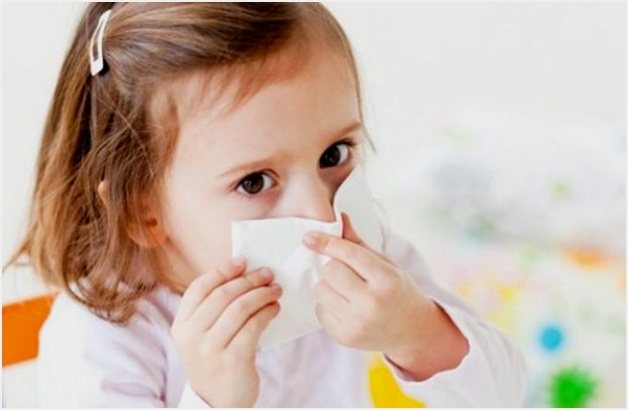
When choosing medications that can be used to treat allergic cough in children, you must carefully study the instructions, which indicate contraindications and side effects. For example, glucocorticosteroid drugs should not be used a priori, because they cause a certain dependence.
Prevention
If your child is diagnosed with an allergy, protect him from contact with external factors that provoke a coughing attack. Also make sure that allergens do not accumulate at home, especially in the room where the child spends most of his time.
Inhalation with nebulizer for cough in children
Recipes for solutions for inhalation with a nebulizer for a runny nose are described in this article.
How to calm a night cough in an adult //drlor.online/diagnostika-lechenie/kashel/nochnoj-u-vzroslyx-prichiny-i-sposoby.html
To do this, take the following measures:
- Wet clean your home regularly. Remove all dust from under beds and closets, and in corners.
- Choose smooth wallpaper to prevent dust from collecting in the folds.
- Do not hang heavy curtains: they collect dust and dirt. If you have blinds, wipe them regularly with a damp cloth.
- If you are allergic to pollen, it is not recommended to open windows; You can ventilate the room using a split system and special filters.
- Children with allergies should not play with soft toys. They collect a lot of dust, mites, insects, and larvae. You shouldn't even keep such toys in the house. For such children, buy wooden, plastic, and rubber toys made of high-quality materials without strong odors of paint and chemicals.
- If your cough gets worse at night, replace down pillows and blankets with synthetic ones.
- Make sure that all cosmetics and household chemicals that the child comes into contact with are hypoallergenic, without dyes or flavors.
- Carpets and books also collect dust a lot. It is better to get rid of carpets altogether. If the floor is cold, you can buy a washable folding floor at any children's store. Books should be stored outside the children's room and only in a closed cabinet. They need to be wiped periodically.
- Sometimes indoor plants and pots with soil become the cause of allergies. Remove them from the children's room, and if necessary, get rid of them altogether.
The best prevention of allergies in a child is considered to be prevention during pregnancy. Try not to eat allergenic foods, and take more walks in the fresh air when your pollen allergy does not worsen.
